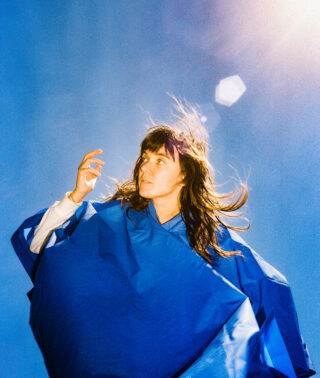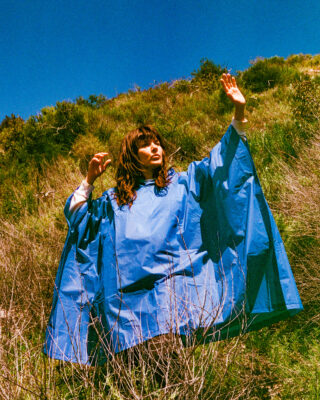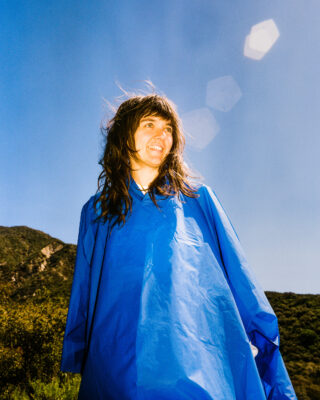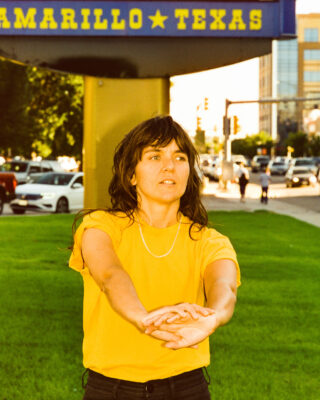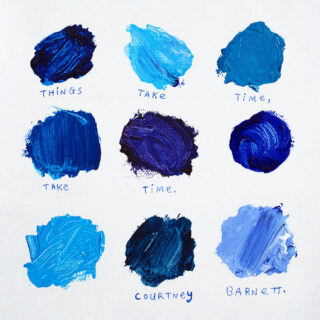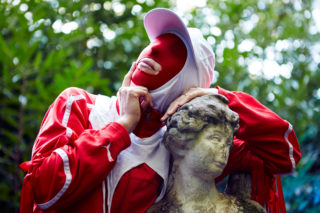Barnett has shown that she is not averse to the odd unexpected career left turn. In 2017, before she had even begun recording her second solo album, she released Lotta Sea Lice, a surprise full-length collaboration with slacker guitar hero Kurt Vile. “I like doing lots of different things,” she says. “It’s nice to break things up and let your brain wander and do something different. That’s the only way to grow, to break outside what you’re used to. I think I’m just really curious, musically. And I feel like to only allow myself to do one thing is just not going to present an interesting outcome.”
Aside from presenting a new aesthetic side to Courtney Barnett, End of the Day has a poignant significance as it will be the last official release on Milk! Records, the award-winning label founded in 2012 by Barnett and fellow musician and former partner Jen Cloher. By providing a platform for independent artists in Melbourne, including dream-pop songwriter Hachiku and art rockers Jade Imagine, Milk! has been a pillar of the city’s thriving alternative scene since its inception. However, an already challenging financial climate was only exacerbated by the pandemic, and twinned with Barnett’s own semi-permanent move to California, the writing was on the wall.
“I think in the end, it just seemed like the right time to close the label,” she reflects. “It’s not an easy thing to keep going. Sometimes you just know in your gut that the time has come to change something, and I think you’ve got to follow that feeling when it happens.”
Several of the scenes in Anonymous Club where Barnett seems at her happiest are when she is in the Milk! headquarters, so it is clear that this is a decision that did not come easily. “I am a very nostalgic person,” she says. “So it’s hard to not cling on to things. Milk! Records has always had such an amazing community of people who are such music lovers, committed to supporting artists and turning up at shows. But it’s good practice in letting go of something and appreciating what it is and what it was, and being grateful for how incredible and life-changing it has been.”
The first ever release on the label was Barnett’s debut EP, I’ve Got a Friend Called Emily Ferris, which, when bundled together with follow-up How to Carve a Carrot Into a Rose, formed the breakthrough release A Sea of Split Peas, a twelve-track 2013 compilation that is now set for a tenth anniversary vinyl re-release.
Included is ‘Avant Gardener’, the song that took Barnett from Australian dive bars to US late night talk shows. Over a bed of strangulated guitars, she tells the story of an asthmatic attack through a prism of jaded, sarcastic malaise, and for the first time, the world hears Barnett’s ability to casually conflate existential despair with offhand flippancy (“I’m breathing but I’m wheezing / Feel like I’m emphysemin’”; “I get adrenaline straight to the heart / I feel like Uma Thurman, post-overdosing kickstart”).
Much like Noah Baumbach and Greta Gerwig’s classic 2012 film Frances Ha, Barnett’s songs soon became a guiding light for an audience seeking a way to navigate the no man’s land of early adulthood in the 2010s; if she was able to articulate the struggle to resist society’s demands to conform, then at least the rest of us were not alone.
 “It’s a funny thing, because a lot of what I was saying in those first few albums was… I was so kind of lost and unsure,” she says. “Having a clear voice and an idea of what I’m saying, sure, but what I’m saying is that I have no idea what I’m saying. So it’s this weird, slightly meta thing. But even in that, maybe that’s what people connect to, because a lot of us don’t know exactly what we’re thinking or what we’re doing or where we’re going. It’s relatable, I guess.”
“It’s a funny thing, because a lot of what I was saying in those first few albums was… I was so kind of lost and unsure,” she says. “Having a clear voice and an idea of what I’m saying, sure, but what I’m saying is that I have no idea what I’m saying. So it’s this weird, slightly meta thing. But even in that, maybe that’s what people connect to, because a lot of us don’t know exactly what we’re thinking or what we’re doing or where we’re going. It’s relatable, I guess.”
Considering how quickly she came flying out of the traps, it appeared from the outside that Barnett had arrived with a fully-formed and somewhat effortless artistic voice, but nothing is as straightforward as it seems.
“There’s always some element of trying to intellectualise it,” she says, pausing to consider how she marries external expectations with her desire to write truthfully. “You know what you should do, or what’s worked before, but what I’ve learned along the way is that there’s no formula. Even when people think there’s a formula, if you follow it, you’re probably going to not be as successful the next time around because it doesn’t come from the same pure place, and you can’t please everybody all the time.
“And so, the only thing to do is to just try to be as honest and real as possible. And you know, even that’s hard because we’re always second guessing ourselves. I’m always second guessing myself. So sometimes, it’s hard to find that place, especially when you know that you’re presenting to a listener. So I’m always thinking how someone’s going to hear it and all the different ways that they could interpret something, and I think the only way to get past that is just to really let go of that thought and try to just get on with it.”




